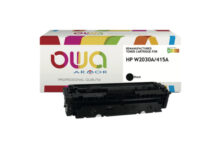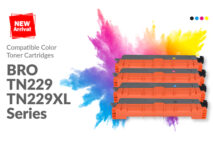One of the most important lawsuits affecting the third-party supplies business today is Lexmark’s toner cartridge patent-infringement complaint currently before the U.S. District Court for the Southern District of Ohio. This suit has become even more significant for the remanufacturing industry now that Lexmark may once again be asserting that remanufacturing Return Program (aka Prebate) cartridges amounts to patent infringement.
Lexmark’s patent-infringement suit was already shaping up to be industry-changing for remanufacturers. Lexmark’s allegations that remanufacturers infringed its patents by using empty Lexmark cores first sold outside the Unites States is based on the U.S. Court of Appeals for the Federal Circuit’s controversial Jazz Photo decision, which established that under U.S. patent law the sale of a product outside the United States does not exhaust a U.S. patent holder’s rights. However, one defendant named in Lexmark’s amended complaint in Ohio, Impression Products, has argued that the Supreme Court’s decision in Kirtsaeng v. John Wiley & Sons overturns Jazz Photo. Impression Products has asked the Ohio court to weigh in on whether the Kirtsaeng decision overturns Jazz Photo and to dismiss Lexmark’s amended complaint (see “Veteran Reman Attorney Ed O’Connor Takes on Lexmark with Motion to Dismiss Ohio Suit.”). Thus, the Lexmark suit has the potential to serve, either in the near future or upon appeal, as the case that makes or breaks Jazz Photo. Obviously, remanufacturers would love to see Jazz Photo overturned as that would free them to use cores sourced anywhere in the world for remanufactured cartridges marketed in the United States.
Now, Lexmark’s Ohio lawsuit is shaping up to be significant for another reason as well. In its opposition to Impression Products motion to dismiss (see “Lexmark and Impression Products Spar over Jazz Photo”), Lexmark not only defended the Jazz Photo ruling but also once again dredged up claims that remanufacturing Return Program cartridges may infringe its patents.
Some Prebate History
Lexmark’s Return Program (or as it was formerly known the Prebate program) is a plan under which the OEM offers customers a significant upfront discount on cartridges in exchange for the promise to use the cartridges only once and then return them to the OEM. Because the Return Program cartridges are so much less expensive than the “regular” versions of Lexmark cartridges, which are sold without any agreement to return them to the OEM, they are far more popular, so much so that the non-Return Program versions of certain SKUs are scarce or nonexistent at retail. Because few customers want to pay a premium for the regular versions of cartridges, the pool of non-Return Program Lexmark cartridges to remanufacture is small.
Thus, the remanufacturing industry declared it a major victory in 2009 when Judge Gregory F. Van Tatenhove ruled in the lawsuit between Lexmark and Static Control Components that “Lexmark’s patent rights in its toner cartridges were exhausted by the authorized, unconditional sales of the cartridges to end users,” and that “The Prebate Program is invalid under patent law.” This decision opened up Return Program cartridges for remanufacturing. While many of Lexmark’s Return Program cartridges are indeed returned to the OEM and thus the pool of Return Program empties is far from plentiful, Judge Van Tatenhove’s decision made it worthwhile for remanufacturers to enter a market that some of them previously had eschewed due both to a scarcity of non-Return Program empties and concern about being slapped with a patent-infringement lawsuit for the very act of remanufacturing Return Program cartridges.
Given Judge Van Tatenhove’s 2009 ruling, it is curious to see Lexmark once again insinuating that patent exhaustion, a doctrine which is the legal cornerstone of the right to repair in the United States, does not apply to Lexmark Return Program cartridges.
Lexmark’s New Assertions about Return Program Cartridges
Lexmark’s opposition to Impression Products’ motion to dismiss states that the accused cartridges that infringe Lexmark’s patents include not only empty and remanufactured Lexmark cartridges first sold outside the United States, but also “clone cartridges and remanufactured Lexmark Return Program cartridges.” The OEM asserts, “International patent exhaustion is irrelevant to remanufactured Lexmark Return Program cartridges.”
In support of its position, Lexmark cites the Ninth Circuit Court of Appeals’ 2005 decision resolving a lawsuit between the Arizona Cartridge Remanufacturers Association (ACVRA) and Lexmark. The ACRA filed suit against Lexmark, alleging that Lexmark’s Prebate program violated unfair competition laws. The group lost upon summary judgment and appealed the matter to the Ninth Circuit, which upheld Lexmark’s right to restrict the use of patented items.
Lexmark also cites a portion of the U.S. Court of Appeals for the Sixth Circuit’s August 2012 decision in the appeal of the Static Control Components and Lexmark suit. (Following Judge Van Tatenhove’s verdict, both parties filed appeals on various grounds.) The Sixth Circuit’s decision was largely regarded as yet another win for Static Control as the appeals court reversed a lower court’s decision that Static did not have standing to bring false-advertising claims against the OEM under the Lanham Act. (Note that Lexmark has since appealed the appeals court’s decision to the Supreme Court, which will soon be addressing the issue of whether Static can being false-advertising claims against the OEM. See “Supreme Court to Decide Whether Static Control Has Standing to Bring False Advertising Complaint against Lexmark”). Specifically, Lexmark cites the Sixth’s Circuit’s decision not to take up Lexmark’s challenge to the decision that the sale of Prebate cartridges exhausts Lexmark’s patent rights. The OEM quotes language the appeals court used calling the patent exhaustion issue as it pertains to Return Program cartridges an “extremely complex and unsettled question.”
For four years now, it has seemed that it has been well established that Lexmark’s first sale of Return Program cartridges, at least inside the United States, exhausts its patent rights. But Lexmark’s opposition to Impression Products’ motion to dismiss indicates that the OEM may resurrect its Prebate patent-infringement claims.
We have no idea how far Lexmark intends to pursue its assertion that patent exhaustion does not apply Return Program cartridges or how successful the OEM can prove with these claims. But one thing is for sure—Lexmark is bound and determined not to share even the merest sliver of its replacement cartridge market with the aftermarket, and the OEM has proven mighty persistent in its use of lawsuits as an instrument for deterring aftermarket competition. Thus, it is possible Prebate arguments long considered dead and buried may rise once again to haunt the third-party supplies industry.
To follow our ongoing coverage of Lexmark’s suit is the Southern District of Ohio suit and related complaints, see Lexmark v. Ink Technologies Printer Supplies et al. (2010).






